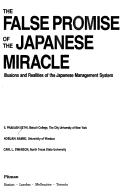| Listing 1 - 10 of 61 | << page >> |
Sort by
|
Book
ISBN: 044630784X Year: 1982 Publisher: New York (N.Y.) : Warner books,
Abstract | Keywords | Export | Availability | Bookmark
 Loading...
Loading...Choose an application
- Reference Manager
- EndNote
- RefWorks (Direct export to RefWorks)

ISBN: 0870115723 4770010621 9784770010629 9780870115721 Year: 1986 Publisher: Tokyo: Kodansha international,
Abstract | Keywords | Export | Availability | Bookmark
 Loading...
Loading...Choose an application
- Reference Manager
- EndNote
- RefWorks (Direct export to RefWorks)
Organization theory --- Japan --- Industrial management --- Industrial management - Japan
Book
ISBN: 2708110527 9782708110526 Year: 1990 Publisher: Paris: Éditions d'organisation,
Abstract | Keywords | Export | Availability | Bookmark
 Loading...
Loading...Choose an application
- Reference Manager
- EndNote
- RefWorks (Direct export to RefWorks)
Book
ISBN: 4866580860 Year: 2019 Publisher: Tokyo: Japan Publishing Industry Foundation for Culture,
Abstract | Keywords | Export | Availability | Bookmark
 Loading...
Loading...Choose an application
- Reference Manager
- EndNote
- RefWorks (Direct export to RefWorks)
From its very origins, Ohmi was a highly developed region bordering Kyoto, the center of political power. For that reason, Ohmi is closely tied to the history of political, cultural, social and economic development in Kyoto, and therefore Japan as a whole.Ancient Ohmi was first developed by immigrants from the Korean Peninsula and China and was a vital crossing point connecting Kyoto with eastern Japan. The intersection of the Nakasendo Road and the Tokaido Road was located within its borders. The vital traffic of people and goods led to the early development of organizations and individuals engaged in the concentrated delivery of vast quantities of products.Ohmi merchants can be considered the very source of Japanese-style management. The key concepts that they developed underpinned the success of Japanese corporations for generations. These include core concepts such as sanpo-yoshi or "three-way satisfaction" and corporate social responsibility (CSR), considering a third-person perspective, being a member of society, a healthy tension with society, customer satisfaction, contribution to society, the social consciousness of "good for the world", appropriate profits, avoid waste and give your all, the spirit of the peddler, faith and devotion, talent and innovation, leveraging information and investing in startup ventures.Inspirational and practical, this book is full of useful ideas and methods that have helped Japanese corporations and individuals achieve success for generations. It is recommended for any student of business or anyone who wants to dig deep into the historical background that helped Japanese companies overcome adversity and achieve greatness.800年を超える歴史を有し、日本の商工業者の源流に位置づけられる近江商人の経営理念「三方よし」をもとに、CSR(企業の社会的責任)をわかりやすく解説したロングセラーの改訂版。巻末索引を増補。「売り手よし・買い手よし・世間よし」の精神はどのようにして生まれたのか、遠隔地への行商と出店をおこなった近江商人たちの実践から現代の経営に生かすことのできるポイントを紹介。.
Shiga-ken (Japan) --- Japan --- Commerce --- History. --- Merchants -- Japan -- Shiga-ken -- History --- Industrial management -- Japan -- Shiga-ken -- History

ISBN: 0674455150 9780674455153 Year: 1987 Publisher: Cambridge (Massachusetts): Harvard university press,
Abstract | Keywords | Export | Availability | Bookmark
 Loading...
Loading...Choose an application
- Reference Manager
- EndNote
- RefWorks (Direct export to RefWorks)

ISBN: 0415085861 041508587X 9780415085878 Year: 1994 Publisher: London: Routledge,
Abstract | Keywords | Export | Availability | Bookmark
 Loading...
Loading...Choose an application
- Reference Manager
- EndNote
- RefWorks (Direct export to RefWorks)
Industrial management --- Production management --- Gestion d'entreprise --- Production --- Case studies --- Gestion --- Etudes de cas --- Labor --- Corporations, Japanese --- Industrial management - Japan --- Production management - Case studies
Book
ISBN: 3921790247 9783921790243 Year: 1996 Volume: 46 Publisher: Köln: Selbstverlag im Wirtschafts- und Sozialgeographischen Institut der Universität zu Köln,
Abstract | Keywords | Export | Availability | Bookmark
 Loading...
Loading...Choose an application
- Reference Manager
- EndNote
- RefWorks (Direct export to RefWorks)
Freight and freightage --- Transportation --- Industrial management --- Affreightment --- Cargo --- Freight handling --- Freight transportation --- Freightage --- Materials handling --- Japanese management --- Freight --- Freight and freightage - Japan --- Transportation - Japan --- Industrial management - Japan
Book
ISBN: 222580947X 9782225809477 Year: 1987 Publisher: Paris: Masson,
Abstract | Keywords | Export | Availability | Bookmark
 Loading...
Loading...Choose an application
- Reference Manager
- EndNote
- RefWorks (Direct export to RefWorks)
Industrial productivity --- Industries --- Productivité --- Industrie --- History --- Histoire --- Just-in-time systems --- Industrial management --- Industrial management - Japan --- Industries - Japan --- Industrial productivity - Japan --- Just-in-time systems - Japan

ISBN: 0273020323 9780273020325 Year: 1984 Publisher: Boston: Pitman,
Abstract | Keywords | Export | Availability | Bookmark
 Loading...
Loading...Choose an application
- Reference Manager
- EndNote
- RefWorks (Direct export to RefWorks)
Business policy --- Japan --- Industrial management --- -Industrial management --- -Business administration --- Business enterprises --- Business management --- Corporate management --- Corporations --- Industrial administration --- Management, Industrial --- Rationalization of industry --- Scientific management --- Management --- Business --- Industrial organization --- Japanese management --- Industrial management - Japan --- Industrial management - United States

ISBN: 0198295553 9780198295556 Year: 2000 Publisher: Oxford: Oxford university press,
Abstract | Keywords | Export | Availability | Bookmark
 Loading...
Loading...Choose an application
- Reference Manager
- EndNote
- RefWorks (Direct export to RefWorks)
Industrial management --- Comparative management --- Reconstruction (1939-1951) --- Gestion comparée --- Reconstruction, 1939-1951 --- Congresses. --- Congresses --- Congrès --- Gestion comparée --- Congrès --- Industrial management - United States --- Industrial management - Europe --- Industrial management - Japan
| Listing 1 - 10 of 61 | << page >> |
Sort by
|

 Search
Search Feedback
Feedback About UniCat
About UniCat  Help
Help News
News